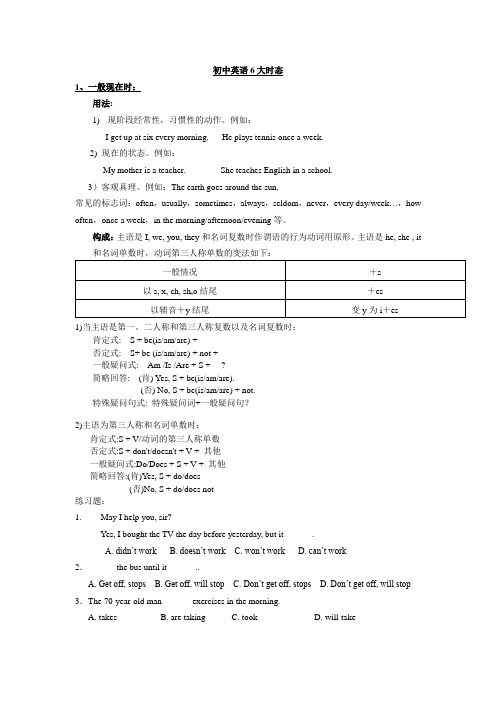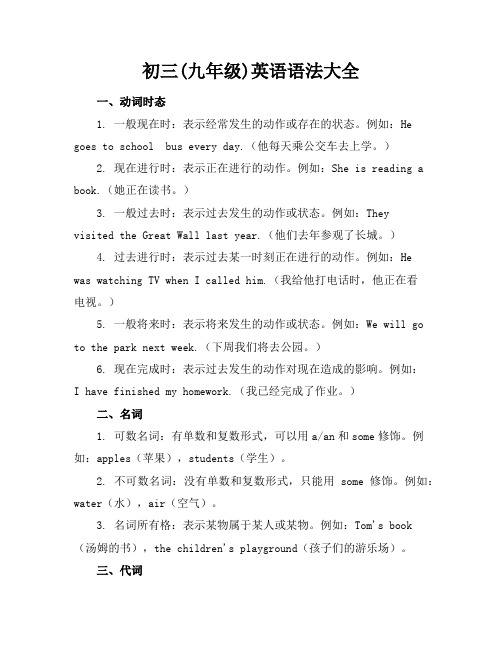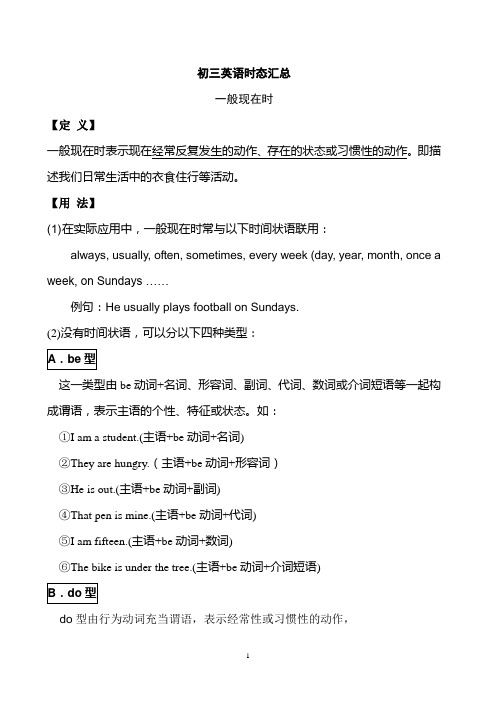九年级英语语法专题6大时态
九年级英语时态知识点总结

九年级英语时态知识点总结1. 一般现在时一般现在时表示经常性的行为、习惯、真理和客观事实,以及一般化的观点。
其结构为:主语 + 动词原形(第三人称单数动词加-s)例句:- She goes to school by bus every day.(她每天坐公交车去学校。
)- Cats like to play with balls.(猫喜欢玩球。
)2. 现在进行时现在进行时表示现在正在进行的动作,以及计划、安排的未来动作。
其结构为:主语 + am/is/are + 现在分词例句:- They are watching a movie now.(他们现在正在看电影。
)- She is meeting her friends tomorrow.(她明天将要和她的朋友们见面。
)3. 一般过去时一般过去时表示过去发生的动作或状态。
其结构为:主语 + 动词过去式例句:- We went to the beach last summer.(我们去年夏天去了海滩。
)- He studied hard for the test.(他为了考试努力学习。
)4. 过去进行时过去进行时表示过去某个时间段正在进行的动作。
其结构为:主语 + was/were + 现在分词例句:- They were playing soccer when it started raining.(下雨时他们正在踢足球。
)- I was studying in the library yesterday afternoon.(昨天下午我在图书馆学习。
)5. 一般将来时一般将来时表示将来某个时间要发生的动作。
其结构为:主语+ will + 动词原形例句:- We will have a party next week.(我们下周要开派对。
)- She will visit her grandparents this weekend.(她这个周末要去看望她的祖父母。
(完整)初中英语6大时态

初中英语6大时态1、一般现在时:用法:1)现阶段经常性,习惯性的动作。
例如:I get up at six every morning. He plays tennis once a week.2) 现在的状态。
例如:My mother is a teacher. She teaches English in a school.3)客观真理。
例如:The earth goes around the sun.常见的标志词:often,usually,sometimes,always,seldom,never,every day/week…,how often,once a week,in the morning/afternoon/evening等。
构成:主语是I, we, you, they和名词复数时作谓语的行为动词用原形。
主语是he, she , it1)当主语是第一、二人称和第三人称复数以及名词复数时:肯定式: S + be(is/am/are) + ···否定式: S+ be (is/am/are) + not + ···一般疑问式: Am /Is /Are + S + ···?简略回答: (肯) Yes, S + be(is/am/are).(否) No, S + be(is/am/are) + not.特殊疑问句式: 特殊疑问词+一般疑问句?2)主语为第三人称和名词单数时:肯定式:S + V/动词的第三人称单数否定式:S + don't/doesn't + V + 其他一般疑问式:Do/Does + S + V + 其他简略回答:(肯)Yes, S + do/does(否)No, S + do/does not练习题:1.--- May I help you, sir?--- Yes, I bought the TV the day before yesterday, but it ______.A. didn’t workB. doesn’t workC. won’t workD. can’t work2.______ the bus until it ______..A. Get off, stopsB. Get off, will stopC. Don’t get off, stopsD. Don’t get off, will stop 3.The 70-year-old man ______ exercises in the morning.A. takesB. are takingC. tookD. will take用法:1).将要发生的动作。
初三(九年级)英语语法大全

初三(九年级)英语语法大全一、动词时态1. 一般现在时:表示经常发生的动作或存在的状态。
例如:He goes to school bus every day.(他每天乘公交车去上学。
)2. 现在进行时:表示正在进行的动作。
例如:She is reading a book.(她正在读书。
)3. 一般过去时:表示过去发生的动作或状态。
例如:Theyvisited the Great Wall last year.(他们去年参观了长城。
)4. 过去进行时:表示过去某一时刻正在进行的动作。
例如:He was watching TV when I called him.(我给他打电话时,他正在看电视。
)5. 一般将来时:表示将来发生的动作或状态。
例如:We will go to the park next week.(下周我们将去公园。
)6. 现在完成时:表示过去发生的动作对现在造成的影响。
例如:I have finished my homework.(我已经完成了作业。
)二、名词1. 可数名词:有单数和复数形式,可以用a/an和some修饰。
例如:apples(苹果),students(学生)。
2. 不可数名词:没有单数和复数形式,只能用some修饰。
例如:water(水),air(空气)。
3. 名词所有格:表示某物属于某人或某物。
例如:Tom's book(汤姆的书),the children's playground(孩子们的游乐场)。
三、代词1. 人称代词:I(我),you(你/你们),he(他),she(她),it(它),we(我们),they(他们)。
2. 物主代词:my(我的),your(你的/你们的),his(他的),her(她的),its(它的),our(我们的),their(他们的)。
3. 指示代词:this(这个),that(那个),these(这些),those(那些)。
初中6种时态结构归纳

初中6种时态结构归纳嘿,大家好!今天咱们聊聊英语中的时态结构,尤其是初中生最常见的六种。
听起来可能有点枯燥,但别担心,我会让它变得轻松有趣。
准备好了吗?那咱们就开始吧!1. 一般现在时1.1 定义和用法首先来聊聊一般现在时。
这是我们最常用的时态之一,主要用来描述习惯性动作或者普遍真理。
比如说:“我每天早上六点起床。
”这可是我的日常,不然就得迟到啦!另外,像“水是湿的”这样的真理,也是用一般现在时来表达的。
1.2 结构它的结构简单明了:主语 + 动词(第三人称加s)。
比如说,"He plays basketball every Saturday." 这个“s”可别忘了哦!总之,一般现在时就像我们的日常生活,简单又实用。
2. 现在进行时2.1 定义和用法接下来是现在进行时,通常用来表示正在发生的事情。
就像我现在正在跟你们聊这些呢!比如,“我正在看电视。
”这个“正在”就体现了事情的进行中。
2.2 结构它的结构是:主语 + am/is/are + 动词ing。
听起来是不是很简单?比如,“She is studying for her exams.” 在这个时候,她可能正盯着书本,眉头紧锁,仿佛世界都与她无关了。
3. 一般过去时3.1 定义和用法好了,继续往下看,一般过去时来了!它主要用来描述过去发生的事情,像是“昨天我去超市了。
”回想起来,那时候我还买了好多零食呢,哈哈!这时态让我们能轻松分享过去的回忆。
3.2 结构结构也很简单:主语 + 动词过去式。
比如,“They visited their grandparents last weekend.” 想象一下,那种温馨的场景,真让人怀念!4. 过去进行时4.1 定义和用法过去进行时就像是在讲一个故事,它强调在过去某一时刻正在进行的动作。
比如,“我昨天晚上七点正在吃晚饭。
”想象一下,桌子上摆满了好吃的,那可真是一场美食盛宴!4.2 结构它的结构是:主语 + was/were + 动词ing。
九年级6单元英语知识点

九年级6单元英语知识点九年级英语第六单元涵盖了多个重要的知识点,包括动词时态、情态动词和被动语态等。
以下是对这些知识点的详细解释和示例。
一、动词时态1. 一般现在时:表示经常性或习惯性的动作或现实真理。
例句:I usually go to school by bus.2. 现在进行时:表示现阶段正在进行或发生的动作。
例句:He is studying for the exam.3. 一般过去时:表示过去某个时间发生的动作或状态。
例句:They visited their grandparents last weekend.4. 过去进行时:表示过去某一时刻正在进行的动作。
例句:We were having dinner when the phone rang.5. 一般将来时:表示将来要发生的动作或状态。
例句:I will finish my homework tonight.二、情态动词1. can:表示能力、许可或可能性。
例句:She can swim very well.2. could:表示过去的能力、许可或可能性。
例句:When I was young, I could run faster.3. may:表示允许、可能性或祝愿。
例句:May I use your computer?4. might:表示过去的可能性或请求。
例句:He said he might come to the party.5. must:表示必须或推测。
例句:We must finish our homework before going out.三、被动语态1. 被动语态由助动词be加上动词的过去分词构成,用于强调动作的承受者。
例句:The cake was made by my mother.2. 被动语态常用于没有明确的执行者或不重要的执行者的情况下。
例句:The letter was sent yesterday.通过掌握这些知识点,学生可以更好地理解和运用英语语法,提高语言表达的准确性和流利度。
初三英语时态汇总(一般现在时、一般将来时、一般过去时和现在进行时、过去进行时、现在完成时、过去完成时)

初三英语时态汇总一般现在时【定义】一般现在时表示现在经常反复发生的动作、存在的状态或习惯性的动作。
即描述我们日常生活中的衣食住行等活动。
【用法】(1) 在实际应用中,一般现在时常与以下时间状语联用:always, usually, often, sometimes, every week (day, year, month, once a week, on Sundays ……例句:He usually plays football on Sundays.(2)没有时间状语,可以分以下四种类型:这一类型由be动词+名词、形容词、副词、代词、数词或介词短语等一起构成谓语,表示主语的个性、特征或状态。
如:①I am a student.(主语+be动词+名词)②They are hungry.(主语+be动词+形容词)③He is out.(主语+be动词+副词)④That pen is mine.(主语+be动词+代词)⑤I am fifteen.(主语+be动词+数词)⑥The bike is under the tree.(主语+be动词+介词短语)do型由行为动词充当谓语,表示经常性或习惯性的动作,其构成为。
如:①I know it. ②He believes me.there be型句子表示“某地存在…”,其构成为,表示客观事实。
用法遵循,即主语是单数或并列主语中的第一个主语是单数,则用there is;主语是复数或并列主语中的第一个主语是复数,则用there are。
如:(1)There is an eraser on the teacher's desk.(主语an eraser是单数)(2)There is an orange,five apples and eight bananas in the bag.(并列主语中的第一个主语an orange是单数)情态动词型句子的构成为,情态动词和动词原形一起构成谓语,表示说话人对所叙述的动作或状态的看法。
九年级语法第六单元知识点
九年级语法第六单元知识点九年级语法第六单元主要包括下列知识点:时态、语态和虚拟语气。
接下来将逐一介绍这些知识点及其用法。
一、时态时态用于表示动作或状态发生的时间。
以下是九年级语法第六单元涉及的几种常用时态:1. 一般现在时:用于表示经常性的动作或现在的状态。
例如:I play basketball every Sunday.(我每个星期天打篮球。
)2. 现在进行时:用于表示目前正在进行的动作。
例如:She is studying for the exam.(她正在为考试而学习。
)3. 一般过去时:用于表示已经发生的过去动作或状态。
例如:He visited his grandparents last weekend.(他上个周末去看望了他的祖父母。
)4. 过去进行时:用于表示过去某个时间正在进行的动作。
例如:They were playing soccer at 6 p.m. yesterday.(昨天下午6点他们正在踢足球。
)5. 一般将来时:用于表示将要发生的动作或状态。
例如:We will go shopping tomorrow.(我们明天要去购物。
)二、语态语态用于表示主语与谓语的关系。
以下是九年级语法第六单元涉及的两种常用语态:1. 被动语态:表示主语是动作的承受者而不是执行者。
被动语态的结构为“be + 过去分词”。
例如:The book was written by Mark Twain.(这本书是马克·吐温写的。
)2. 主动语态:表示主语是动作的执行者。
主动语态的结构为主语 + 动词。
例如:Mark Twain wrote the book.(马克·吐温写了这本书。
)三、虚拟语气虚拟语气用于表达与事实相反或假设的情况。
以下是九年级语法第六单元涉及的几种常用虚拟语气:1. 虚拟条件句:用于表示与现实相反的假设情况。
其中包括三种类型:a. Type 1: If + 现在时态,将来时态。
初中英语6个时态
初中英语6个时态
初中英语六个时态分别是:现在进行时、现在完成时、现在完成进行时、一般过去时、一般将来时和过去将来时。
1. 现在进行时:表示现在正在进行的动作或存在的状态,基本结构是be动词(am/is/are)+动词的现在分词(动词+ing)。
2. 现在完成时:表示动作发生在过去但与现在有联系,基本结构是have/has+动词的过去分词(done)。
3. 现在完成进行时:表示动作从过去开始一直持续到现在,并且还会继续下去,基本结构是have/has+been+动词的现在分词(doing)。
4. 一般过去时:表示在过去某个时间发生的动作或存在的状态,基本结构是动词的过去式。
5. 一般将来时:表示将来某个时间将要发生的动作或存在的状态,基本结构是will+动词原形。
6. 过去将来时:表示在过去某个时间将要发生的动作或存在的状态,基本结构是would+动词原形。
(完整)初中英语六大时态
六大英语时态一、一般现在时:(1)经常性、习惯性的动作或存在的状态Eg: I go to school on foot.(2) 主语的特征、性格、能力、爱好等Eg: I like watching TV.(3) 客观真理Eg: The moon moves round the earth.其结构按正常语序,即“主语+谓语+其他”。
有时为了起强调作用,时间状语也可提前。
一般现在时的句式变化可分为两种情况:○1一般人称做主语,表示动作变否定句时,须在动词前加助动词don’t;变一般疑问句时,须在句首加助动词do.Eg: 肯定句They have lunch at 12. 否定句:They don’t have lunch at 12. 一般疑问句: Do they have lunch at 12.○2第三人称单数作主语,谓语动词变单三;变否定句时,须在动词前加助动词doesn’t; 变一般疑问句时,须在句首加助动词does Eg: He does morning exercises.→He doesn’t do morning exercises.→Does he often go to school on foot?一般现在时的时间状语有on Saturdays, in the morning(afternoon, evening),every day, at weekend, how often及一些频率副词often, usually, always, sometimes, seldom, never 等。
动词变单三规则1. 一般情况下,在动词后直接加-s Eg: works, gets, says, reads2. 以s, x, sh, ch, o结尾,加-es Eg: goes, teaches, washes, does3. 以“辅音+y” 结尾,变y为i,再加-es Eg: fly-flies, study-studies4. 不规则变化have-has二、一般过去时:表示过去某时发生的动作或情况(1)过去某个时间所发生的动作或存在的状态Eg: He was a worker two years ago.(2) 过去一段时间内,经常性或习惯性的动作Eg: When I was a student, I often played with my classmates.(3)谈到已故人的情况时多用过去时Eg: Lu Xun was a great writer.(4) 有些发生时间不是很清楚(未明确表述)的情况,实际是过去发生的,也应用过去时态Eg: What did you say?一般过去时的结构是“主语+动词的过去式”。
九年级英语上册语法专题大时态
九年级英语上册语法专题大时态Document serial number【NL89WT-NY98YT-NC8CB-NNUUT-NUT108】九年级英语(上册)语法专题——6大时态复习(1)班别:_______________学生姓名:_______________组别号:_______________九年级英语(上册)语法专题——6大时态复习(2)班别:_______________学生姓名:_______________组别号:_______________二、反馈练习(题目中如有时态标志,请划出来。
)1)用所给单词的适当形式填空。
1.I____________(tell)himthenewsassoonasIseehim.2.Janeandherparents_____________(fly)akiteintheparklastFriday.3.They_____________(swim)intheriveratteno’clockyesterdaymorning.4.InordertowatchthenewsonTV,heoften_______________(finish)hishomeworkbefore7o’clock.5.Heruncle________________(teach)inthisschoolsince2002.6.Hismother_______________(get)upatsixo’clockandmadebreakfastforhim.7.Look!Mike______________(play)chesswithDavid.8.Myfatherisn’tathome.He_________________(go)towork.9.WhenIopenedthedoor,Mum_________________(cook)inthekitchen.10.Bettywillgoshoppingwithmeifit_________________(notrain)tomorrow.2)选择填空()1.–Wha t’sthatnoise?--Janeandhersister_________TV.A.havewatchedB.arewatchingC.watched()2.–There______aconcertthisevening.–Yeah.Excitingnews!A.aregoingtobeB.isgoingtobeC.isgoingtohave()3.IhopeTina_____tomybirthdaypartyontimenextWednesday.A.tocomeeC.willcome()4.Tom_____alotoffriendssincehecametoChinalastyear.A.madeB.makesC.hasmade()5.–Didyouseethetrafficaccidentyesterday?--Yes.IthappenedwhenI____pastthemuseum.A.walkB.amwalkingC.waswalking()6.–Haveyoureadthisbook?--Yes.I_____ittwoweeksago.A.isreadingB.havereadC.read()7.—Whereisyourfather?Wehaven’tseeneachotherforweeks.--___________.A.HehasbeentoAmerica.B.HehasgonetoEngland.C.HeisgoingtoAustralia.()8.Hetellsmethathisgrandpa______.A.dieB.deadC.hasdied()9.Doyouknowwhenthedoctor_______?Thesickpeoplefeelterrible.A.willarriveB.arrivesC.arrived()10.Iwillgivehimthemessageassoonashe______back.A.willcomeB.camees()11.Whenshe______thenewspaper,John_____asleep.A.read;wasfallingB.wasreading;fellC.read;fell()12.Idon’tknowifhe______thisterm.Ifhe_____,hewilldobetterinmaths.A.studieshard;studieshardB.willstudyhard;studieshardC.studieshard;willstudyhard()13.–I’msorryyouhavemissedthebus.It_____fiveminutesago.–Whatapity!A.wasleavingB.hasleftC.left()14.–Shallwegoshoppingnow?--Sorry,Ican’t.I_____myshirts.A.washB.washedC.amwashing()15.–Excuseme.Lookatthesign:Noparking!--Sorry,I_____it.A.haven’tseenB.didn’tseeC.don’tsee()16.–WhendidyouborrowtheEnglishstorybook?--Iborroweditlastweek.I____itforaweek.A.hadB.havekeptC.haveborrowed()17.MyfriendLilyknowsmyhometownverywellbecauseshe____theremanytimeswithme.A.hasgoneB.hadbeenC.hasbeen()18.JackhasstudiedChineseinthisschool____theyearof2000.AsinceBinCon()19._____you_____thetextyet?Yes,we_____ittwohoursago.A.Did;copy;hadB.Have;copied;haveC.Have;copied;did()20."He____todrawhorsesalready.""When____helearn?”."Lastyear."A.haslearned;didB.learned;didC.haslearned;has()21.Thesun__intheeastand__inthewest.A.rose;sunkB.rises;sinksC.rise;sink()22.Iamsorrythatyouhavemissedthetrain.It__tenminutesago.A.leftB.leavesC.willleave()23.Look!Theboystudentsare_______footballwhilethegirlsare_______.A.playing,danceB.playing,dancingC.play,dancing()24.He___finishedhishomeworkyet.A.doesn’t B.haven’t C.hasn’t()25.Theoldman______Chinaseveraltimesinthepast10years.A.hasbeentoB.wenttoC.goesto()26.He___hishomefortenyears.A.hasleftB.wasawayfromC.hasbeenawayfrom()27.JackhasstudiedChineseinthisschool_____theyearof2000.A.sinceB.inC.on()28.–Haveyougonetoseethedoctor?--No,butI________.A.didn’tB.amgoingtoC.haven’t()29.Iwon’tforgetmyteacherbecauseshe_____sokindtomesinceIcametothisschool.A.hasbeenB.willbeC.was()30.–Badluck!It’stoolate!--Itdoesn’tmatter.Themovie____foronlyafewminutes.Youcan’tmissit.A.hasbeganB.hasbeenonC.began3)完成句子1.他哥哥通常骑单车上学。
- 1、下载文档前请自行甄别文档内容的完整性,平台不提供额外的编辑、内容补充、找答案等附加服务。
- 2、"仅部分预览"的文档,不可在线预览部分如存在完整性等问题,可反馈申请退款(可完整预览的文档不适用该条件!)。
- 3、如文档侵犯您的权益,请联系客服反馈,我们会尽快为您处理(人工客服工作时间:9:00-18:30)。
九年级英语(上册)语法专题—— 6大时态复习(1)班别:_______________ 学生姓名:_______________ 组别号:_______________九年级英语(上册)语法专题—— 6大时态复习(2)班别:_______________ 学生姓名:_______________ 组别号:_______________二、反馈练习(题目中如有时态标志,请划出来。
)1)用所给单词的适当形式填空。
1. I ____________(tell) him the news as soon as I see him.2. Jane and her parents _____________(fly) a kite in the park last Friday.3. They _____________(swim) in the river at ten o’clock yesterday morning.4. In order to watch the news on TV, he often _______________(finish) his homework before 7 o’clock.5. Her uncle ________________(teach) in this school since 2002.6. His mother _______________(get) up at six o’clock and made breakfast for him.7. Look! Mike ______________(play) chess with David.8. My father isn’t at home. He _________________(go) to work.9. When I opened the door, Mum _________________(cook) in the kitchen.10. Betty will go shopping with me if it _________________(not rain) tomorrow.2)选择填空( )1. –Wha t’s that noise?--Jane and her sister _________ TV.A. have watchedB. are watchingC. watched( )2. –There ______ a concert this evening. –Yeah. Exciting news!A. are going to beB. is going to beC. is going to have( )3. I hope Tina _____ to my birthday party on time next Wednesday.A. to comeB. comeC. will come( )4. Tom _____ a lot of friends since he came to China last year.A. madeB. makesC. has made( )5. –Did you see the traffic accident yesterday?--Yes. It happened when I ____ past the museum.A. walkB. am walkingC. was walking( )6. –Have you read this book? --Yes. I _____ it two weeks ago.A. is readingB. have readC. read( )7.—Where is your father? We haven’t seen each other for weeks. --___________.A. He has been to America.B. He has gone to England.C. He is going to Australia. ( )8. He tells me that his grandpa ______. A. die B. dead C. has died( )9. Do you know when the doctor _______? The sick people feel terrible.A. will arriveB. arrivesC. arrived( )10. I will give him the message as soon as he ______ back.A. will comeB. cameC. comes( )11. When she ______ the newspaper, John _____ asleep.A. read; was fallingB. was reading; fellC. read; fell( )12. I don’t know if he______ this term. If he _____, he will do better in maths.A. studies hard; studies hardB. will study hard; studies hardC. studies hard; will study hard( )13. –I’m sorry you have missed the bus. It _____ five minutes ago. –What a pity!A. was leavingB. has leftC. left( )14. –Shall we go shopping now? --Sorry, I can’t. I _____ my shirts.A. washB. washedC. am washing( )15. –Excuse me. Look at the sign:No parking! --Sorry, I _____ it.A. haven’t seenB. didn’t seeC. don’t see( )16. –When did you borrow the English story book? --I borrowed it last week. I ____ it for a week.A. hadB. have keptC. have borrowed( )17. My friend Lily knows my hometown very well because she ____ there many times with me.A. has goneB. had beenC. has been( )18. Jack has studied Chinese in this school ____ the year of 2000. A since B in C on ( )19. _____you _____ the text yet ? Yes, we _____ it two hours ago.A. Did ; copy; hadB. Have; copied; haveC. Have; copied; did( )20. " He ____ to draw horses already ."" When ____he learn?”. " Last year. "A. has learned; didB. learned; didC. has learned; has( )21. The sun __ in the east and __ in the west.A. rose; sunkB. rises; sinksC. rise; sink( )22. I am sorry that you have missed the train. It __ ten minutes ago.A. leftB. leavesC. will leave( )23. Look! The boy students are _______ football while the girls are _______.A. playing, danceB. playing, dancingC. play, dancing( )24. He ___ finished his homework yet. A. doesn’t B. haven’t C. hasn’t( )25. The old man ______ China several times in the past 10 years.A. has been toB. went toC. goes to( )26. He___ his home for ten years.A. has leftB. was away fromC. has been away from( )27. Jack has studied Chinese in this school _____ the year of 2000. A. since B. in C. on ( )28. –Have you gone to see the doctor? --No, but I ________.A. didn’tB. am going toC. haven’t( )29.I won’t forget my teacher because she _____ so kind to me since I came to this school.A. has beenB. will beC. was( )30. –Bad luck! It’s too late!--It doesn’t matter. The movie ____ for only a few minutes. You can’t miss it.A. has beganB. has been onC. began3)完成句子1. 他哥哥通常骑单车上学。
His brother usually __________________________________________________________ by bike.2. 未来家会更舒服。
Home __________________________________________________ more comfortable in the future.3. 天暖和了,我脱去了大衣。
